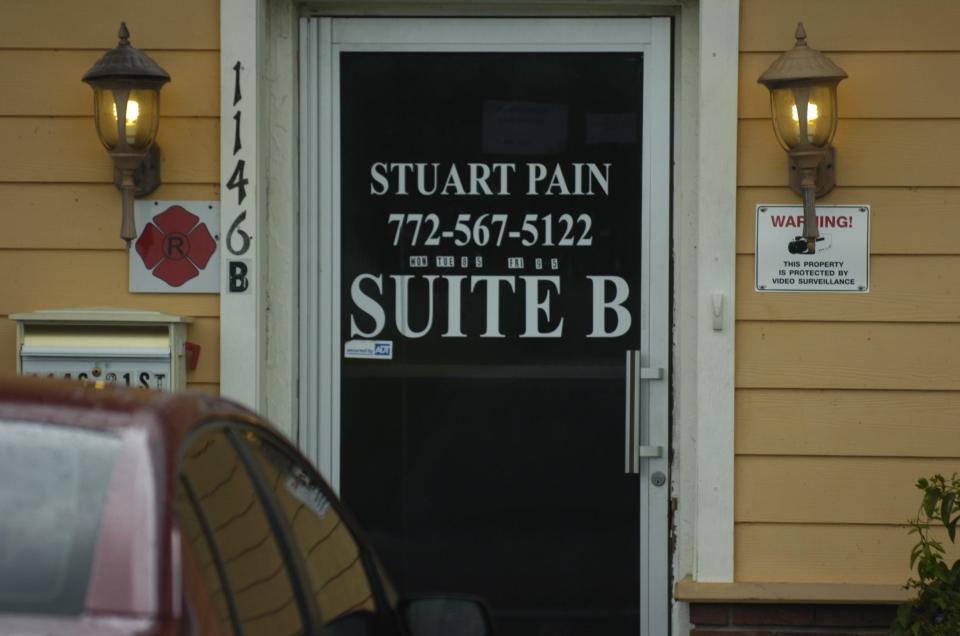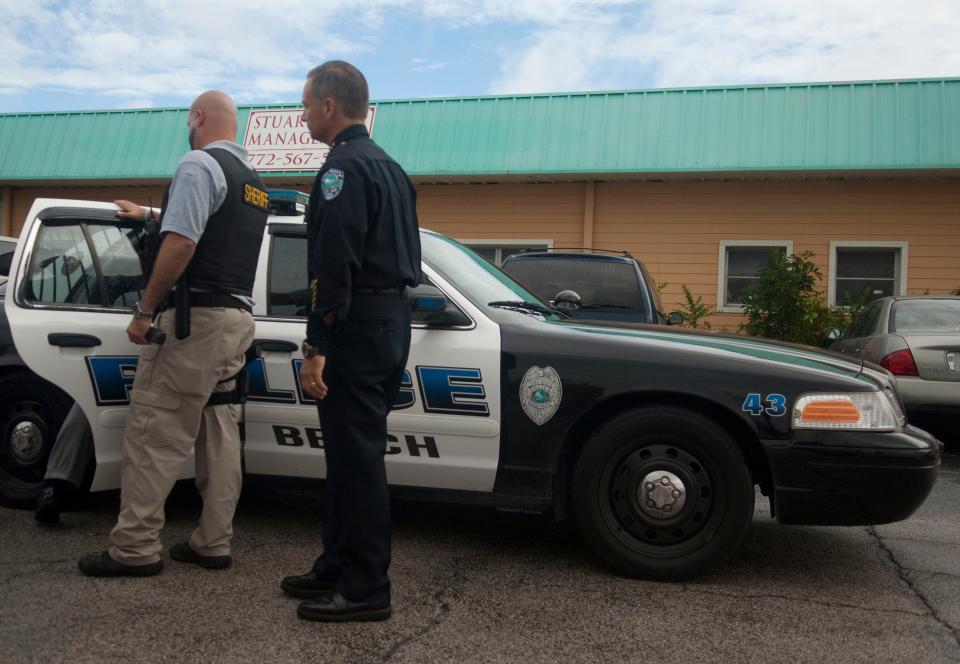Judge tosses charges related to 2012 'pill mill' raids in Operation Pill Street Blues
A dozen years after Vero Beach became the epicenter of a statewide probe dubbed Operation Pill Street Blues that closed eight pain clinics, a judge threw out charges filed against seven doctors and seven clinic owners accused of handing out an estimated 2 million pills a year, court records show.
Authorities have said the June 27, 2012 clinic raids and arrests that wrapped up a two-year state and federal investigation, helped change Florida’s reputation as a go-to pill mill destination for people seeking easy access to highly addictive opioids.
By 2011, Florida lawmakers had banned doctor shopping, toughened rules related to operating pain clinics and dispensing pharmacies and launched the state’s Prescription Drug Monitoring Database, which tracks doctors prescribing painkillers and the names of patients buying them.
The only clinic closed on the Treasure Coast was the Vero Beach-based Stuart Pain Management Center. It was reported by Drug Enforcement Administration agents to be part of an organization with links to clinics raided in Daytona Beach, Gainesville, Miami, Sarasota and Fort Myers.
An estimated 43,000 phone conversations were intercepted via court-approved wiretaps during the investigation that seized $1.1 million from 59 bank accounts.

Felony charges filed in June 2012 against 14 defendants – including former Stuart Pain Management Center medical director Dr. Bruce Kammerman, 65, formerly of Palm City, and Lewis Stouffer, 44, a former Pompano Beach firefighter − ranged from racketeering to delivery of controlled substances, trafficking, money laundering and manslaughter.
Sixth Amendment right to a speedy trial
Since then, the expansive case being prosecuted in Indian River County by Florida’s Office of Statewide Prosecution, has churned through four judges, 41 motion hearings and an appeal that stalled progress for several years.
Circuit Judge Robert Meadows in a Feb. 13 order dismissing the protracted case, faulted Statewide Prosecution attorneys for repeated delays tied to failing to turn over discovery material – information, data and records - that defendants are entitled to receive prior to a trial.
Meadows granted a defense request to dismiss all charges “for constitutional speedy trial violations,” and found the “primary reason for delay was the state’s failure to fulfill their discovery obligations.”
“The defendants have filed no less than 28 motions requesting discovery that the state was obligated to produce,” Meadows noted in a 20-page order. “Despite numerous orders by the court …the state deliberately impeded with the defense in a very material fashion and went far beyond mere negligence ...”
Meadows concluded that “prejudice to the defendants in this case by the deliberate calculated delays by the state is far beyond a presumptive prejudice.”
“The state,” he continued, “failed to provide even a scintilla of evidence that the delays were by mere negligence.”
In determining whether a right to a speedy trial has been violated, Meadows said factors to be considered include: The length of the delay; the reason for the delay; whether a defendant timely asserted their rights; and the existence of “actual prejudice as a result of the delay.”
“An extraordinary delay of 12 years is presumptively prejudicial,” he ruled.
Meadows too, acknowledged that prosecutors and defense attorneys have cited myriad reasons for lengthy delays, including the number of defendants, the complexity of the case, the amount of discovery, appeals that took months to resolve, and the COVID-19 pandemic.
Florida Statewide Prosecutor Nicholas B. Cox in an email said his office will ask Meadows to reconsider his ruling.
“We plan to file a motion for rehearing before the trial judge this week and our motion will respond to parts of the court’s order,” Cox said Monday.
Meadows in his order noted that the file of a confidential informant used in the investigation was never provided to the defense, and in fact, was destroyed by the Indian River County Sheriff’s Office, “the very agency spearheading” the case.
Also missing, Meadows wrote, was the patient file of Forrest Cyphers, 34, whose March 7, 2012 overdose death formed the basis for a manslaughter charge filed against Dr. Roger Gordon, 77, of Plantation.
And while prosecutors for 12 years insisted the Cyphers file didn’t exist, Meadows noted the state had it the whole time and “miraculously” provided it to the defense on Jan. 18.
He noted, too, that since 2012, eight “material witnesses” have died, other witnesses have moved, retired, changed jobs, or can’t be located.
Plea deals
Records show Stouffer and two physicians arrested have pleaded guilty.
Susan Yandle, 56, a Jacksonville doctor who worked at a Daytona clinic, in 2016 pleaded guilty to racketeering and conspiracy to commit racketeering. She was sentenced to two years of community control, eight years of probation and gave up her medical license.
Fernando Valle, 66, of Orlando, who was arrested while working as a doctor at a Fort Myers clinic, received the same punishment in 2017 after pleading to similar charges.
Stouffer though, who faced a three-year prison term as part of a plea deal, has not been sentenced, according to his attorney Andy Metcalf, who expects Meadows’ order to be appealed.
“The state has appellate rights, so we're waiting to see what will happen. We're obviously very happy with the ruling,” Metcalf said. “It's a complex case, it needs to be resolved. And I think the judge made the right decision.”
The Pill Street Blues probe was one of the largest of its type in the state's history, former Attorney General Pam Bondi said at a June 2012 news conference at the Indian River County Sheriff's Office.

"These people are despicable,” Bondi said. “They used the trust of the public to distribute drugs to our children."
‘Bold move’
When authorities shuttered the Stuart Pain Management Center, its lead doctor Bruce Kammerman, who then lived in Palm City, was cuffed and escorted by officers to the Indian River County Jail for booking.
His Stuart lawyer Lance Richard on Tuesday said Kammerman, who retained his medical license and lives in Fort Lauderdale, always maintained his innocence.
Richard described Meadows’ ruling as “a very bold move by the judge.”
“It's also a very well thought out and reasoned opinion,” he said. “He lays out all of the motions to compel: ‘Turn this over, turn this over’ … and it just never was. I think he (Meadows) just got to the end of his rope.”
Kammerman is still in disbelieve Meadows ended the case, Richard said.
“He’s cautious to see what’s going to happen next,” he said. “He is looking forward to moving on with the rest of his life. These people have been through a lot.”

Indian River County Sheriff Eric Flowers, who stood by his agency’s work in the investigation, said Meadows’ order was “unfortunate.”
Flowers, who was a detective at the time, helped oversee wiretaps, clinic visits by undercover informants and complied search warrant affidavits.
“I'm certainly disappointed that the case has been tossed at this point,” he said. “I know the things that I did were meant to bring justice for this, and it's unfortunate that it's worked out like this.”
He acknowledged Meadows made some valid points in that, “people have a right to not have to sit more than a decade waiting for a criminal case.”
“Even though they may never have to sit in jail, seven of these defendants were doctors,” he said. “The fact that they had to sit 12 years under this, is probably punishment in and of itself.”
Lake Okeechobee: El Niño rains to blame for Lake water sent to the St. Lucie River, Stuart
Flying before driving: PSL teen soars through solo flights on 16th birthday
Melissa E. Holsman is the legal affairs reporter for TCPalm and Treasure Coast Newspapers and is writer and co-host of "Uncertain Terms," a true-crime podcast. Reach her at melissa.holsman@tcpalm.com. If you are a subscriber, thank you. If not, become a subscriber to get the latest local news on the Treasure Coast.
This article originally appeared on Treasure Coast Newspapers: IRC Judge dismisses 2012 'pill mill' case dubbed Pill Street Blues

